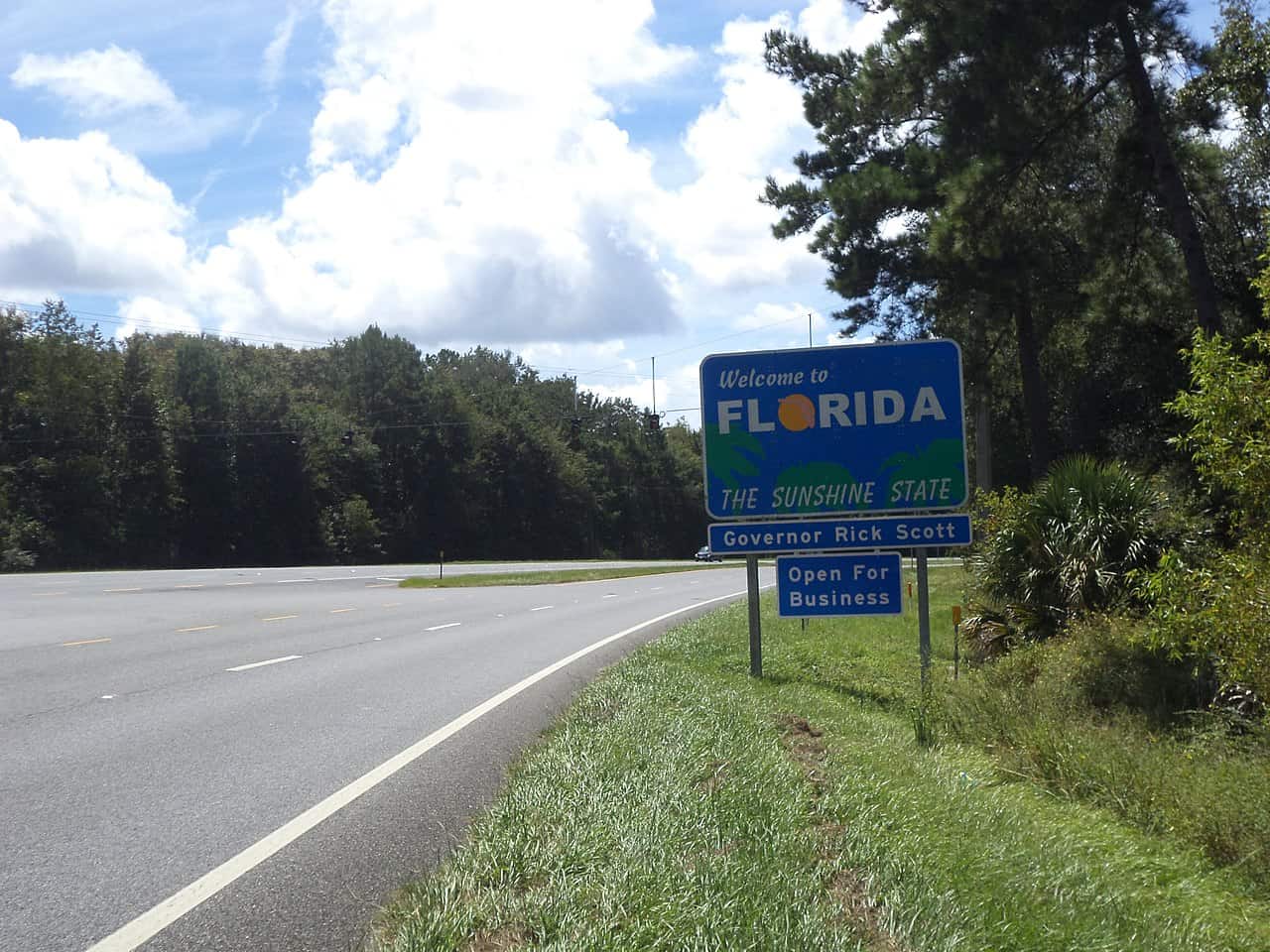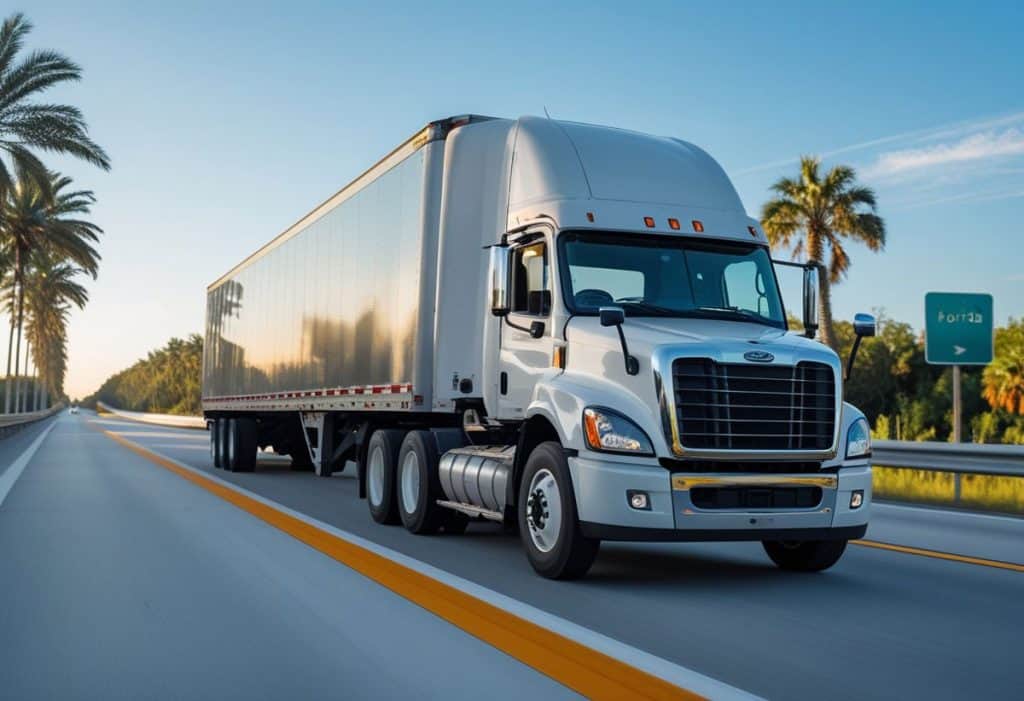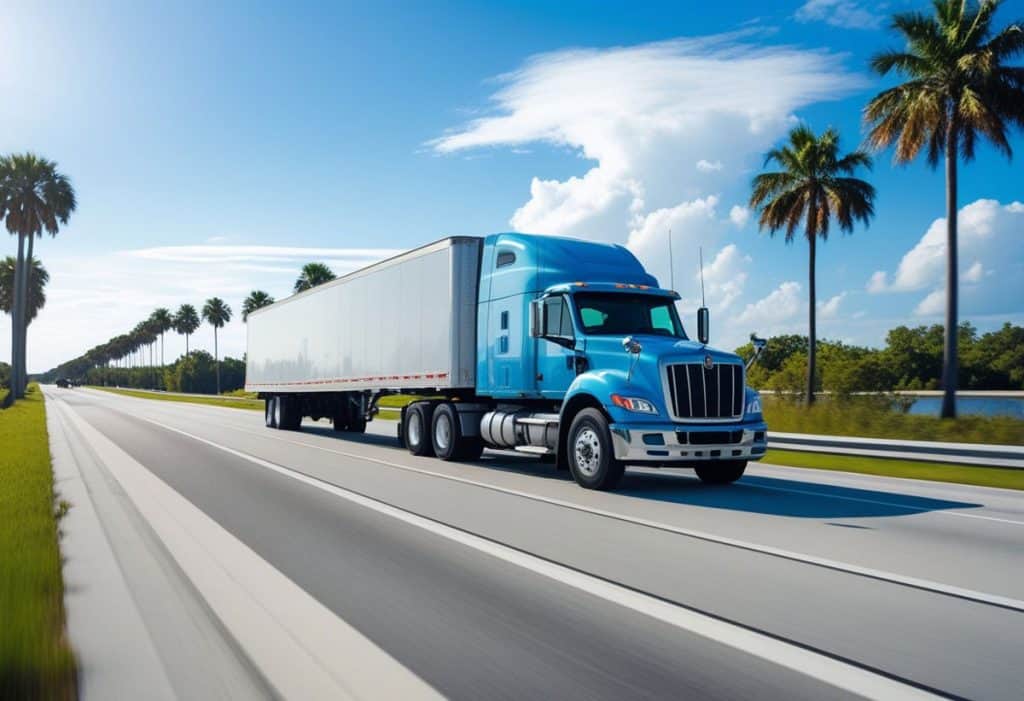Florida Commercial Truck Insurance

Florida truck drivers deal with some pretty strict insurance rules, whether they’re hauling loads across state lines or sticking to routes within Florida. The state sets all sorts of coverage minimums depending on what you’re carrying and how far you’re driving. Liability limits can go from $300,000 for household goods up to $5 million if you’re moving hazardous materials. It’s a lot to keep track of.
On average, commercial truck insurance in Florida runs about $15,522 per year, but you’ll see most single-truck policies falling somewhere between $12,648 and $17,856.
Of course, that’s just the ballpark—your actual cost depends on things like your driving record, what you haul, how long you’ve been at it, and which insurer you talk to. Florida commercial truck insurance costs can swing wildly, sometimes by thousands, even if you’re running the same type of operation.
Finding the right coverage isn’t exactly a walk in the park. You’ve got to juggle state and federal requirements, and it pays to shop around—quotes can be all over the map. It really helps to have an agent who knows the ins and outs of Florida’s commercial truck insurance landscape. Progressive Commercial offers Florida state and federal insurance filings for truckers trying to stay compliant.
Trucking Insurance Requirements In Florida

Commercial truck operators in Florida need to meet certain minimum liability amounts and deal with both state and federal rules. You’ll need to show proof of insurance if you get pulled over or inspected—that’s just part of the job.
Minimum Liability Coverage
Florida truck drivers are required to carry at least trucking primary liability coverage. The specifics depend on the truck’s weight and what you’re hauling.
Standard Minimum Coverage Requirements:
| Truck Type | Minimum Liability |
|---|---|
| Light commercial trucks (10,001-26,000 lbs) | $300,000 |
| Heavy trucks (over 26,000 lbs) | $750,000 |
| Hazardous materials transport | $1,000,000-$5,000,000 |
Hauling hazardous materials? That’s where the highest coverage limits kick in. The coverage is meant to pay for property damage and injuries if you’re at fault in an accident—nobody wants to be on the hook for that out of pocket.
State and Federal Regulations
Many trucks operate across state lines and so commercial truck insurance requirements in Florida are governed by both state and federal laws. The FMCSA (Federal Motor Carrier Safety Administration) sets the rules for interstate haulers.
Key Regulatory Requirements:
- Interstate carriers must follow FMCSA’s federal rules
- Intrastate carriers stick to Florida’s state requirements
- Motor carrier permits call for proof of insurance
- DOT numbers come with their own coverage minimums
Proof of Insurance and Compliance
Truck drivers have to carry proof of insurance—no exceptions. Cops or DOT inspectors can ask for it pretty much anytime you’re on the road.
Required Documentation:
- Current insurance certificate or card
- Motor carrier identification report (MCS-150)
- Operating authority documents
- Vehicle registration
Your insurance certificate has to be up to date and meet the minimums. If it’s expired or doesn’t cut it, expect fines or violations.
Types of Commercial Truck Insurance Coverage in Florida
There’s more to staying covered in Florida than just meeting the bare minimums. Truckers here need a mix of insurance types to protect their business and keep regulators happy. Each one does something a little different, whether it’s covering third-party claims or your own cargo and downtime.
Primary Liability Insurance
This is the big one—primary liability insurance is a must for every commercial truck in Florida. It’s what protects you if you cause an accident that injures someone or damages property.
Florida requires commercial truck drivers to carry minimum liability coverage of $10,000 for personal injury protection and $10,000 for property damage. That said, let’s be real—those numbers don’t go far in a serious wreck.
Most trucking outfits need much higher limits, especially if they’re running interstate. FMCSA sets those rules based on what you’re hauling and how far you go.
Common liability coverage limits include:
- $300,000 for general freight
- $750,000 for oil and hazardous materials
- $1,000,000 for certain specialized cargo
- $5,000,000 for extremely hazardous materials
Physical Damage Coverage
Physical damage coverage is all about protecting your own truck from damage or loss. It’s got two main parts: collision and comprehensive.
Collision pays for repairs if you hit another vehicle or object. Comprehensive is for things like theft, fire, storms, vandalism—you get the idea.
It’s not technically required by law, but if you’ve got a loan on your truck, your lender’s probably going to insist. They want to make sure their investment’s protected.
What you’ll pay for this coverage depends on your truck’s value, age, and type. Newer rigs cost more to insure. Don’t forget the deductible—that’ll affect your premium too.
Physical damage coverage usually helps with:
- Fixing your truck after a crash
- Protection from theft or bad weather
- Replacing the truck if it’s totaled
- Coverage for add-ons or custom equipment
Motor Truck Cargo Insurance
Motor truck cargo insurance steps in if the stuff you’re hauling gets damaged, stolen, or lost. It’s a lifesaver for businesses that can’t afford to eat the cost of spoiled or missing goods.
Cargo insurance is especially important for businesses that rely on timely deliveries. Without it, you’re on the hook for whatever you’re hauling.
How much coverage you need depends on the value of your usual loads. Limits often range from $10,000 up to $100,000 or more for pricier cargo.
Cargo insurance covers a bunch of scenarios—accidents, rollovers, fire, theft, even weather. But if your load spoils because your reefer breaks down, you’ll need to add special coverage for that.
Typical cargo coverage situations:
- Theft from the truck
- Damage while loading or unloading
- Loss in a crash
- Weather wrecking the goods
Non-Trucking Liability Insurance
Non-trucking liability is for when you’re not actually working—like if you’re using your truck for personal stuff. It’s especially handy for owner-operators who drive their rigs home or run errands off the clock.
This fills in the gap when your main insurance doesn’t apply because you’re not on a job. Non-trucking liability protects owner-operators during personal use of their commercial vehicles. Otherwise, you might be driving around with no protection at all.
It’s a lot like personal auto insurance, just for your work truck. It covers injuries and property damage you cause while you’re off the clock, usually with limits similar to your regular policy.
Non-trucking liability covers:
- Personal trips in your truck
- Driving to and from home
- Non-business errands
- Deadheading (sometimes, if you’re not under dispatch)
What Is The Average Commercial Auto Insurance Cost in Florida?
Commercial truck insurance in Florida is all over the map price-wise. Average annual cost hovers around $15,522, but honestly, what you’ll pay depends on your operation, your trucks, and a bunch of other quirks.
Annual Premium Ranges:
Here’s what most folks see:
- Owner-operators: $1,200 to $3,000 per year
- Trucking businesses: $8,000 to $18,000 per truck, per year
- Most premiums: $12,648 to $17,856
Monthly Cost Breakdown:
Average monthly is about $933, or roughly $11,200 a year. That’s if you’re running a typical commercial trucking outfit.
Factors Affecting Costs:
What pushes your costs up or down?
- Cargo type—hazmat always costs more
- Driving record—clean history pays off
- Business experience—newbies pay extra
- Operating radius—long haul costs more than local
Covered Vehicles and Truck Types in Florida

Florida commercial truck insurance stretches across all sorts of rigs, from solo owner-operators to big fleets. Coverage needs shift depending on what you haul, how heavy your trucks are, and where you run.
Owner Operator Trucks
Owner-operators in Florida usually run Class 8 semis, tractor-trailers, or big rigs. Because of their size and the damage they could cause, insurance minimums are on the higher side.
If you’re going interstate, you need at least $750,000 in liability. Staying in-state? Requirements range from $300,000 up to $5 million, depending on the cargo.
Popular owner-operator trucks include:
- Peterbilt and Kenworth tractors
- Freightliner Cascadia
- Volvo VNL series
- Mack Anthem
Most of these pull dry vans, flatbeds, or reefers. If you’re hauling high-value or temperature-sensitive loads, Motor Truck Cargo coverage is pretty much non-negotiable.
Don’t forget, Florida owner-operators also need at least $10,000 of Personal Injury Protection (PIP). It’s no-fault, so it pays out even if you’re to blame for a wreck.
Fleet and Small Business Vehicles
Small trucking companies have a mixed bag—medium-duty trucks, delivery vans, box trucks, you name it. Sometimes it’s a blend of local delivery and long-haul units.
Medium-duty trucks (Classes 4-6) like Ford F-550s, Isuzu NPRs, and Hino 155s usually need less liability coverage than the big rigs.
Fleets often include:
- Step vans for packages
- Straight trucks with lift gates
- Refrigerated box trucks
- Flatbeds under 26,001 GVWR
Small fleets can save a headache with policies that cover all their vehicle types. If you’ve got four or more employees, workers’ comp insurance is mandatory, whether you like it or not.
Fleet operators also tend to go for comprehensive coverage, partly to take advantage of Florida’s windshield law—free glass repairs come in handy with all the road debris around here.
Specialty and Heavy-Duty Trucks
Specialty vehicles need beefed-up coverage, plain and simple. These rigs might haul hazardous materials, oversize loads, or even people.
Hazmat trucks are required to carry $5 million in liability—no shortcuts. That goes for tankers with chemicals, fuel, or anything dangerous.
Heavy-duty specialty vehicles include:
- Passenger buses (16+ seats): $5 million liability
- Oil haulers: $1 million minimum
- Oversize load carriers: Higher liability limits
- Tow trucks/wreckers: Special coverage needs
Lowboy trailers and heavy haulers? You’ll want coverage for both the truck and the custom gear. Physical damage insurance is a must, considering replacement costs aren’t exactly pocket change.
And don’t overlook construction trucks like mixers and cranes. They need protection for third-party property damage, especially since accidents in busy areas can get ugly fast.


